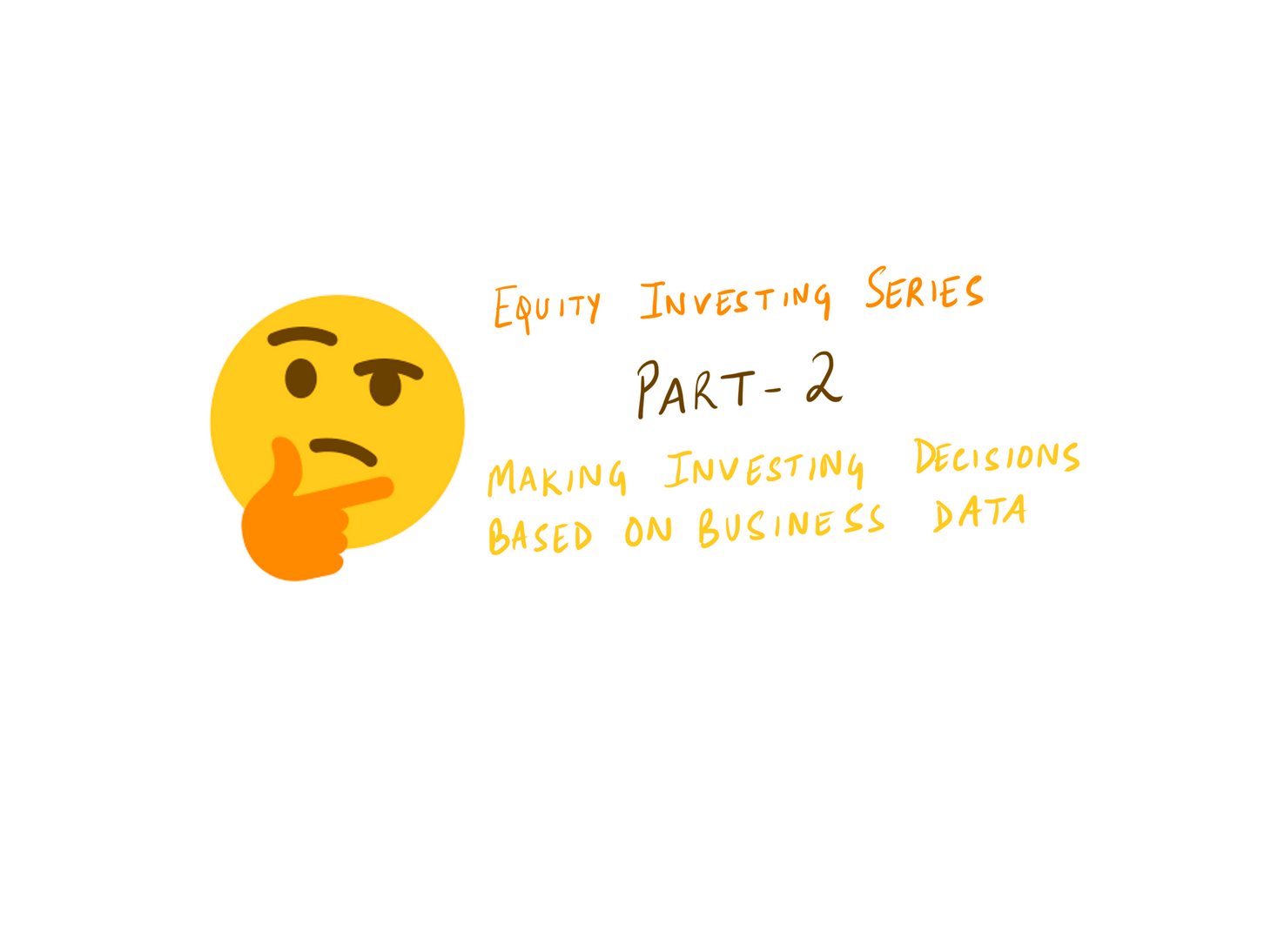Equity Investing: Part 2 - Making Investing Decisions Based on Business Data
A share represents a business, and if the business does well, the share price will also increase...

Table of Contents
In Part 1 of the Equity Investing Series, we introduced the two popular approaches used to take investing decisions:
- Using the information generated in the business - like sales, profit, etc.
- Using the information from the market - like price, volume of transactions, etc.
In Part 2, we'll dive deep into the first of these - making investing decisions using information generated in the business. Users of this method focus on the fact that - a share represents a business, and if the business does well, the share price will also increase. So, to be successful - one must value the business and make investment decisions based on this valuation.
I too use this approach to select stocks to invest in.
The purpose of this series is to introduce the reader to the game of investing, and the focus is on the listed space. This article will continue on that path in following format -
- Understanding the business
- Is the business good at making money?
- Studying the industry
- Know the management
- The price to pay
- Keeping track
- When to sell
- Some suggestions
Understanding the business
Start with the why! And take it from there...
Why does the business exist? Who does it serve? What products or services does it produce? What industry is it a part of? Which geographies does it operate in? Any other points worth noting?
Let's answer these questions for a simple bakery store in Chandigarh, India.
- Why does the business exist? - To sell bakery products.
- Who does it serve? - households and restaurants (customers = people who buy the products or services provided by the business).
- What products or services does it produce? - Breads, cakes, biscuits, rolls and pies.
- Which industry is it a part of? - Food and Beverages. (There's no one authoritative list of all industries. A list can be as condensed or as detailed as one likes. But to get an idea, the reader can see this list. PS: "sectors" and "industries" are generally used interchangeably)
- Where does the business operate? - a retail shop in Chandigarh (geography).
- Other pertinent points (if any)? - like “oldest baker of Chandigarh”
Understanding the business thus, sets us up for the rest of the way. And I cannot stress this enough - please document the answers to these (I do it in the form of a table). The process of writing it down will show you the gaps in your knowledge, and by filling those gaps one tends to reach a attain a well rounded understanding of the business.
Onto the next step...
Is the business good at making money?
When you buy a car you want to know its specifications. Engine capacity, average, boot space, additional features, etc. Similarly, you should learn as much about the company as possible before you invest.
Accounting measures key metrics of a business and presents them through three key documents - the balance sheet, the statement of profit and loss, and the cash flow statement. In India, these are usually prepared for a financial year (a 12 month period from 1st April to 31st March).
From the data presented in these documents, an investor tries to answer the key question - is the company good at making money?
While analysing a companies, the things I look for are -
- A year on year track record of generating profits.
- Growth in both sales and profit year after year.
- Low or no debt. And if there is debt, the company should have a high interest coverage ratio.
- A cash flow statement that shows that profits are converted into cash. And that a company isn't facing trouble recovering money from its customers. (Compare "profit after tax" with "cash flow from operations")
Studying the industry
Every company operates within an industry. Taking the time to study the industry allows one to make sense of what is happening in the business. Is it a growing industry or a mature one? How many competitors are there? Is there a clear leader of market share? If yes, then why? Is the industry cyclical or stable in nature? and so on.
It's vital to understand market size, growth, competition, innovations, etc. and analyse where our company in question stands. And how it's approaching various challenges and opportunities.
Two great places to study any industry are - ibef.org and the annual report of the largest company of that industry.
Additionally, a quick comparison of how the company's accounting performance looks against that of peers is a must. Things like sales and profit growth, asset and inventory turnover, and debtors.
Comparing these would show us who is primed to progress in the long run.
PS - one should always compare in percentages and ratios. Comparing absolute numbers is foolhardy.
Know the management
A great business in the hands of corrupt management is not just useless, but dangerous to investor money. The worst kind of business is - one that grows a lot, but none of that prosperity flows to the shareholders.
Ascertaining that the management sees themselves as trustees of investor capital is essential. How can we do this?
- Check compensations received by key management persons (in the annual report). Compare it with industry peers, on a percentage basis, and check for reasonableness.
- Check for shady related party transactions. Many a time it's been seen that the promotor group (those who essentially control the company) make small companies on the side, and generate profits in them by making transactions with the main company. An astute investor needs to steer clear of such companies.
The price to pay
Everything is good only at a price. If I tried to sell you a shirt for ₹ 1 Crore - you would expect it to never get damaged or dirty, always stay new and ironed, be bullet proof, have an air-conditioner and heater inside it, change colour and design on your command, and even then you would seek ₹ 90 Lakh cash back.
The price you pay for a share is your ultimate weapon. It's the only thing you can control. The market throws thousands of rates at you every day. You can choose what to buy.
The dream is to buy a decent company, that is growing, run by extremely talented and honest individuals who are themselves invested in the company, in an industry which is going to be big in future - at a huge discount. This would increase the odds of success while minimising the chances of loss.
A popular metric to use to judge expensive-ness is the price to earnings ratio (PE ratio). Simply calculated as the current market price / earnings. I find this useful, but I've noticed most investors see only this, without putting it in context with the company's history, and with the industry. The PE ratio is a guide, but it's not a clincher by itself.
Keeping track
Making an investment doesn't end with buying stock. You have to ensure that your money is in safe hands. Much like how you nurture a sapling. By checking on it consistently. The ways to do that are -
- Google alerts for the company name will keep you up to speed with new about the companies you invest in.
- Every quarter, listed companies publish their quarterly results. Keep track of them to know what's going on. Do this for all companies that you own stocks of, or are considering investing in.
- Read transcripts of investor conference calls (also available on the company's website). Many analysts working full-time in the money management industry ask questions, and the management answers them. The quality of questions is usually high. And the answers give us a sense of what the management is like, and how they are approaching key issues.
When to sell
This is probably the toughest part. Which is why not overpaying is so important. Even veteran investors often get their sales wrong. However, here are a few tips -
- Sell when there's a major change in management. You don't want to be in the dark.
- Sell when the sales and profits have been declining for a prolonged period of time (anything between 3 quarters and 2 years, depending on the industry).
- Sell when debt levels have risen to uncomfortable levels.
Some suggestions
- Make screener.in your best friend. Spend time on it the way you do on Instagram.
- For starters, pick a small company. A company which runs a focussed business instead of being into too many things. Like walking before you learn to run!
- Till you complete your analysis of your first company, don't move to another one. When you're more experienced, you can abandon analysis if you spot something which is a deal breaker.
- Every year, listed companies publish something called an annual report (available on the company's website, in the investor relations section). This presents - key accounting statements, explanations by the board of directors, and management discussion and analysis, for the year gone by. Reading an annual report is a great education into the business of the company. As you read more and more of these, you'll get better at skimming through stuff that isn't important. Print the first annual report you ever read. Underline and scribble extensively. Later you can switch to digital.
- See accounting data of at least the last 5 years. Read the latest annual report, and skim the other four. Anyone can have one good year.
- When you complete your analysis of your first company, since you would have spent so much time and effort in understanding it, you'll feel like buying it's stock. As a an action to justify your hard work. Don't rush it! Try to write down your rationale of buying it in 2 tweets or less. If it makes sense. Go ahead. Otherwise, find another company to research.
- Don't stop at summaries. Go deep. If you're uninterested in / too busy to go deep, hand over your capital allocation decisions to someone else, like buy a mutual fund. Most people are too lazy to do proper research. They then buy stocks on gut feeling and/or hearsay, get less than optimal results, and then declare that stock market is a gambling den.
To conclude this post, I'd like to give a quick shout out to Dr Vijay Malik, from whose website I've learnt much; and to Kenneth Jeffrey Marshall, whose book - Good Stocks Cheap, has helped me build a manageable investing process.
Next week we'll look into taking investing decisions using information from the market.✌🏼
Stebi Newsletter
Join the newsletter to receive the latest updates in your inbox.

